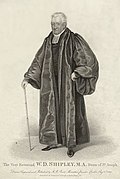Portal:Freedom of speech/Selected article/1
The Case of the Dean of St Asaph, formally R v Shipley, was the 1784 trial of William Shipley, the Dean of St Asaph, for seditious libel. In the aftermath of the American War of Independence, electoral reform had become a substantial issue, and William Pitt the Younger attempted to bring a Bill before Parliament to reform the electoral system. In its support Shipley republished a pamphlet written by his brother-in-law, Sir William Jones, which noted the defects of the existing system and argued in support of Pitt's reforms. Thomas FitzMaurice, the brother of the Earl of Shelburne, reacted by indicting Shipley for seditious libel, a criminal offence which acted as "the government's chief weapon against criticism", since merely publishing something that an individual judge interpreted as libel was enough for a conviction; a jury was prohibited from deciding whether or not the material was actually libellous. The law was widely seen as unfair, and a Society for Constitutional Information was formed to pay Shipley's legal fees. With financial backing from the society Shipley was able to secure the services of Thomas Erskine KC as his barrister. Shipley was tried in 1784 by Mr Justice Buller and a specially convened jury at Shrewsbury. Edward Bearcroft, counsel for the prosecution, argued that on the basis of the existing system the jury could not decide on the nature of the pamphlet, while Erskine argued not only that they could, but that the material did not constitute seditious libel, containing as it did "a solemn protest against all sedition". Persuaded by Erskine's arguments, the jury ruled that Shipley was not "guilty" or "not guilty", but instead "guilty of publication only", a confusing and non-standard ruling which, after a long dialogue, Mr Justice Buller declared to mean "guilty on all charges". Erskine appealed the decision to the Court of King's Bench on 8 November, where the judges again ruled that juries could not decide whether material was libellous, but nevertheless released Shipley on a technicality; his freedom was greeted with fireworks and bonfires, and Erskine was rewarded with the Freedom of the City of Gloucester. Still seeking to reform the law, Erskine sent the court records to Charles James Fox and Lord Camden, who, after much effort, passed the Libel Act 1792, which secured the right of juries to decide whether or not material was libellous.

